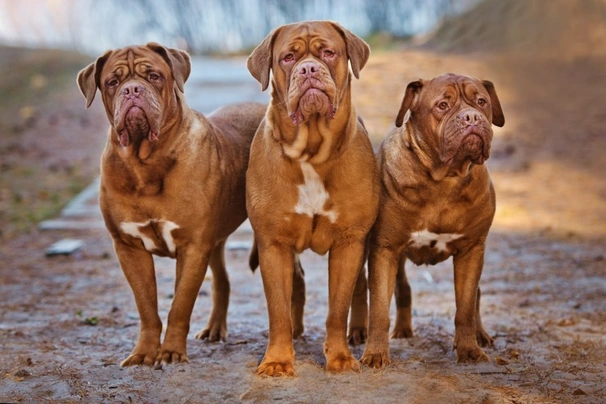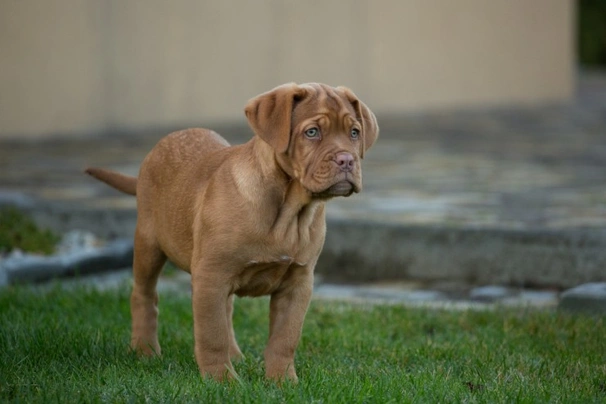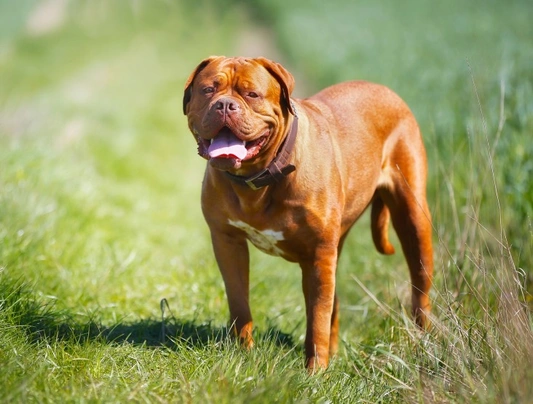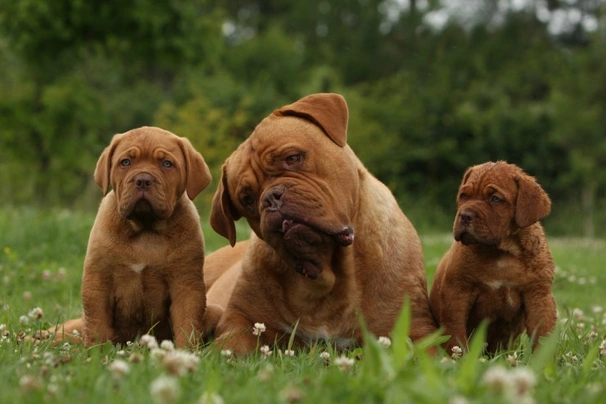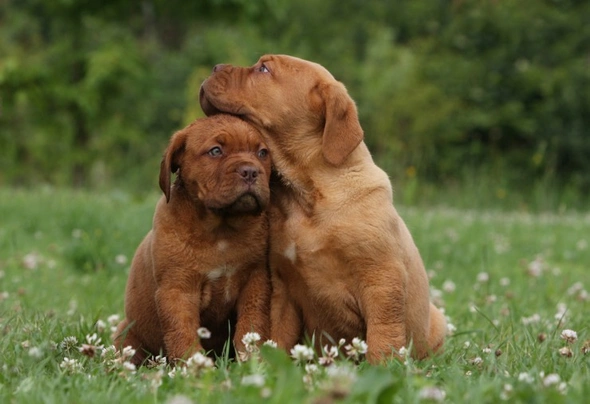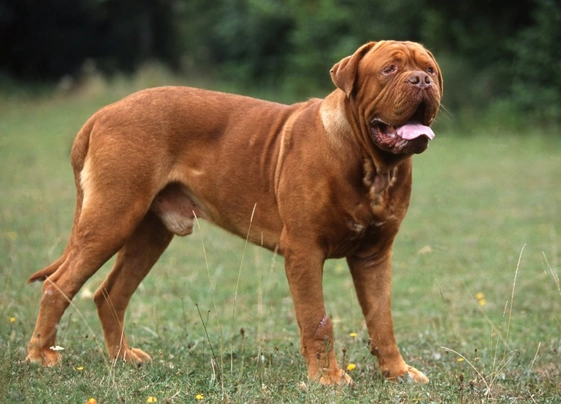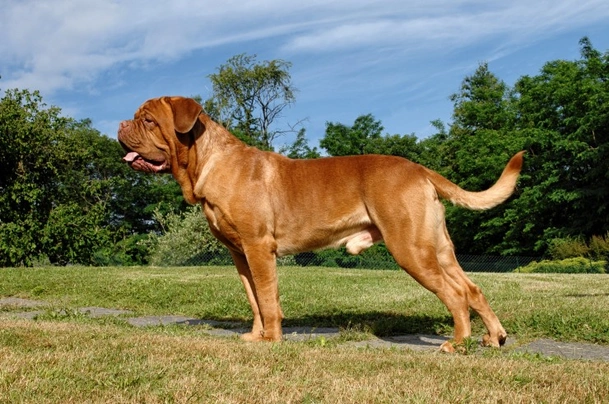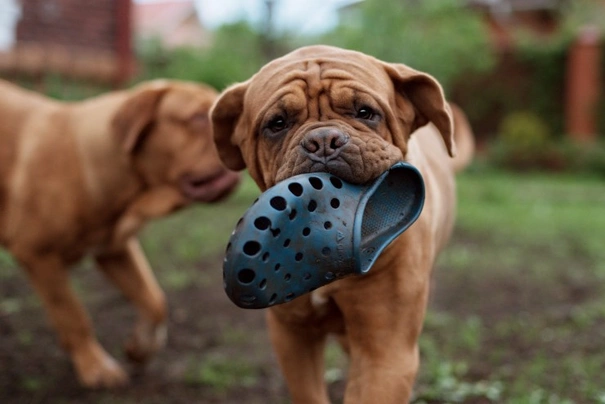Dogue De Bordeaux
Pros
Cons
Introduction of the Dogue De Bordeaux
The Dogue de Bordeaux is one of the most ancient breeds that's native to France. They were originally bred to hunt large animals and were often used as fighting dogs back in the day. They are impressive looking with their very large distinctive heads and although they are so big they are extremely agile and quick on their feet when they need to be and as such a Dogue de Bordeaux is more than capable of jumping great heights which includes garden fences.
Their intimidating looks and impressive size belies a gentle and affectionate character that in the right hands and environment together with the correct sort of training and early socialisation the Dogue de Bordeaux is a wonderful canine companion to have around the home which is why they have a popular choice in their native France and why the breed is gaining popularity elsewhere in the world including here in the UK where they have fast become one of the more popular breeds in the country.
History of the Dogue De Bordeaux
Affectionately known as the Dogue the breed is one of the most ancient that is native to France. It is thought the Dogue could well be a descendant of a breed called the “Alan” and more especially the “alan vautre” that a French writer of the 14th Century wrote about in his book "le Livre de Chasse" which translated means the Book of Hunting. He described these dogs as having a "bite stronger than three sighthounds".
Although the actual origins of the breed have been lost in time many people think that the Dogues heritage can be attributed to a time when the region of Bordeaux was ruled by the English who took their bulldogs and mastiffs with them. They mated their native English dogs with local cattle dogs as well as hounds. As such it is thought that English Mastiffs and other breeds could well be in the breed's ancestry although this is often hotly disputed.
At the time there were quite a few smaller fighting dogs in France namely the Doguin d'Aquitaine as well as the Bulldogue du Midi. There were also giant breeds like the Toulouse Bulldog which is thought to have been used to develop early French Mastiffs. It is also thought that Spanish breeds including the Alano Espanol as well as the Perro de Toro Espanol may have been an influence in early baiting dogs that were around in France back in the day.
During the 19th Century Dogues were not well known outside of the region of Aquitaine where they were often seen hunting in the field tracking down larger game which included wild boar. They were also used to guard properties as well as herds of cattle and were a popular choice of French butchers thanks to their strong guarding instincts.
It was not until 1863 that the first French dog show was held in the capital of Paris and when the Dogue de Bordeaux was first exhibited under that name. With this said over time there have been various types of "dogues" which included the Dogue de Toulouse the Dogue de Paris as well as the Dogue de Bordeaux which is thought to be the ancestor of the Dogues we see today.
The first breed standard was established in France in 1896 which was reviewed in 1910 only to be renewed again in 1971. The breed standard was again reviewed by Raymond Triquet and Philippe Serouil the president of the French Dogue de Bordeaux Club in 1993. Amendments to the standard were then added in 2007.
Between the two World Wars the breed suffered with their numbers dropping dangerously low to such an extent that it was thought that Dogues might vanish altogether with Hitler having done everything in his power to ensure the breed's demise. By the end of the Second World War there were less than 10 breeding pairs left in the entire world.
Fortunately and thanks to the efforts of breed enthusiasts which included a Professor Raymond Triquet breed numbers started to rise again during the 1960's and continued to do so for the following decades. The breed was seen to change from a dog that was similar to the Cane Corso to one that successfully adapted to living alongside man as well as other animals. The Dogue de Bordeaux was to become one of the most popular breeds not only in their native France but in the UK too. The breed was officially recognised by The Kennel Club in 1997 and today the number of dogs being registered is continuing to rise.
Interesting facts about the breed
- Is the Dogue de Bordeaux a vulnerable breed? No they are among the most popular dogs in the UK and elsewhere in the world thanks to their adorable looks and kind loving natures.
- The Dogue is one of France's most ancient breeds
- The breed was saved from extinction by Professor Raymond Triquet
- A DDB played the part of Beasley in the film Turner and Hooch
- The Dogue de Bordeaux is often used as a therapy dog
- Dogues drool - and they drool a lot
- Dogues are also known as French Mastiffs
Appearance of the Dogue De Bordeaux
Height at the withers: Males 60 – 69 cm Females 58 – 66 cm
Average weight: Males 68 kg Females 57 kg
The Dogue de Bordeaux is a powerful looking dog that boasts a muscular body. Although quite heavy they are athletic dogs capable of covering a lot of ground when needed. Their most distinguishing feature is their large broad head and quite serious and ferocious expression. The top of their head is slightly rounded and boasts having a pronounced stop as well as a distinct median groove. They have quite prominent foreheads which adds to their forbidding appearance.
Dogues have furrows and wrinkles on their faces and quite prominent well-muscled cheeks. Muzzles are powerful and short being slightly hollowed under a dog's eyes and having a moderate amount of folds. The topline of a dog's muzzle is ever so slightly turned up and their nostrils are broad and nicely opened being pigmented to match a dog's mask.
Their jaws are extremely powerful and broad with their lower jaw curving upwards. Chins are well defined with dogs having a thick upper flew that's quite pendulous when seen in profile. Viewed from the front they have a distinct V where their upper lips meet their lower ones. Eyes are oval-shaped and set wide apart on a dog's face. They have a frank expression about them and eye colour can be anything from hazel to dark brown according to a dog's coat colour.
Ears are quite small and slightly darker than a dog's coat colour. Their ears fall forward with the front edge touching a dog's cheek when they are alert or excited. Tips are slightly rounded and ears are set high on a dog's head. They have undershot jaws but their teeth cannot be seen when a dog's mouth is closed.
Necks are well-muscled and strong with the skin around it being supple firm and loose. A well-defined dewlap starts at a dog's throat and forms folds down their forechest adding to the appearance of strength and power. Their neck is a lot broader at the base but merges smoothly to a dog's well laid-back shoulders. Withers are well defined with front legs being straight strong and extremely well-muscled.
They boast very broad deep and powerful chests which are well let down to a dog's elbows. Ribs are well sprung and their back is broad and muscular with a straight topline and bellies that are slightly tucked up. Loins are broad solid and a little short with dogs having a moderately sloping croup to where the tail is set.
Back legs are muscular and extremely strong with well-developed second thighs. Their feet are strong with tight toes and strong curved nails. Pads are supple and well-developed with dogs standing well up on their toes. Their back feet are slightly longer than their front ones. Their tails are thicker at the root and dogs carry them low although when excited or alert they carry them raised.
When it comes to their coat the Dogue de Bordeaux boasts having a short fine coat that's soft to the touch. Their skin is loose fitting and thick but without too many folds or wrinkles. Their coats are self-coloured being shades of fawn that range from Isabella right through to mahogany. The only colour which is highly undesirable in the breed is chocolate. Dogues should have a lot of pigmentation and a small amount of white is allowed on their chests as well the extremities of a dog's legs whereas any white on a dog's head or on their body is highly undesirable under their Kennel Club breed standard.
The Dogue de Bordeaux can have 3 mask types which are as follows:
- Black mask with the mask not extending above a dog's eyes but a small amount of black shading is permissable on their ears skulls necks and down a dog's topline. Their noses must be black.
- Brown mask where both eye rims and noses are brown
- No mask which fawn coloured Dogues have where they skin looks reddish and their noses too may be reddish in colour
The accepted coat colours for the breed under the Kennel Club standard is as follows:
- Fawn
- Isabella
- Mahogany
- Red
- Red & White
- Red with Black Mask
- Red with Brown Mask
- Tan
Gait/movement
When a Dogue de Bordeaux moves they do so with a free and athletic gait considering their size. They have a lot of power in their hindquarters covering a good amount of ground with their front legs. When they move at a faster pace the Dogue de Bordeaux has a lower head carriage.
Faults
The Kennel Club frowns on any exaggerations or departures from the breed standard and any faults would be judged on how much they affect a dog's overall health and wellbeing as well as their ability to perform.
Male Dogues should have both testicles fully descended into their scrotums.
It is also worth noting that a Dogue de Bordeaux may be a little bigger or smaller and they may weight slightly less or a bit more than stated in their Kennel Club breed standard which is to be used as a guide only.
Temperament of the Dogue De Bordeaux
Dogues puppies are incredibly cute and it is hard to imagine that they grow into massive dogs that have no idea of just how big they are. Dogues don't fully mature and grow to their full size until they are around 2 years old with some of them taking even longer to do so.
An adult Dogue de Bordeaux is an impressive and intimidating looking dog but they are affectionate and loyal characters that thrive on being in a family environment and they generally love everyone they meet. With this said male Dogues tend to be a little more dominant than their female counterparts but again with the right sort of handling and early socialisation this type of behaviour can be successfully controlled and gently curbed providing it is done early in a dog’s life.
Early socialisation is a must because as previously mentioned a cute Dogue puppy will grow into a very large dog and one that can be a little over-protective of their families because of their sheer devotion to them. Dogues can be a quite stubborn when the mood takes them and some can show a more arrogant side to their natures which is something to be avoided at all costs with such large dogs.
A Dogue is not the best choice for first time owners because they do a lot better when handled and trained by people who are familiar with the breed and therefore know just what it takes to look after and care for this type of very large and impressive dog. They are extremely intelligent and therefore must be handled fairly yet firmly so they understand who is the alpha dog in a household. These dogs are much happier characters when they know their place in the “pack” and who they can look up to for direction. If they are not given the right sort of guidance from the word go they will show a more dominant side to their character which could result in a dog becoming wilful and unruly therefore that much harder to manage and live with.
Because they are so intelligent a bored Dogue de Bordeaux can become quite destructive around the home which is their way of releasing their frustration at not having enough to occupy their minds and/or given the right amount of daily exercise. Other considerations when thinking about sharing a home with a Dogue de Bordeaux are that these dogs need enough space to express themselves and because they are prone to certain health concerns it is definitely worth taking out pet insurance to prevent having to dig deep when it comes to vet bills further down the line.
Dogues are renowned for their slobbering which means they are not the best choice for anyone who is too house proud because when they drool they really drool a lot and it tends to get everywhere.
Are they a good choice for first time owners?
Although Dogues are gentle giants they are not the best choice for first time owners simply because they need to be handled and trained by people who are familiar with the specific needs and who have the time to dedicated to a large and impressive canine companion.
What about prey drive?
A Dogue de Bordeaux does have a high prey drive and more especially if they have not been well enough socialised from a young age which must entail them meeting lots of other animals. Same sex aggression is also another problem in the breed and many Dogues cannot be trusted around cats and smaller pets either.
What about playfulness?
Dogues mature slowly which means they remain very puppy-like until they are two years plus old. The problem is that when they are that much larger it can be harder to handle them when they get too boisterous during playtime. It is very important to differentiate between when a Dogue is being playful and when they are showing a more dominant side to their natures which is why they are better suited to people who understand their personalities and who know how to handle them.
What about adaptability?
Dogues need lots of space to express themselves as they should. As such they are better suited to people who have large back gardens for their pets to romp in bearing in mind that fences must be secure and high because a Dogue is renowned for their climbing abilities and the fact they are highly skilled when it comes to jumping great heights.
What about excessive barking?
The Dogue de Bordeaux is a "natural" watchdog and they are protective of their families and their properties. However they are not a dog that would bark for the sake of it but rather because there are strangers about or when something they don't like is going on in their environment.
Do Dogues like water?
Some Dogues love being in water and will happily play in the waves when being walked along a beach. Others however don't even like to get their feet wet and it's not a good idea to force a dog because it will end up frightening them even more. Anyone who owns a Dogue de Bordeaux that loves being in water must take care when walking their pets off their leads near more dangerous watercourses just in case they decide to leap in.
Are Dogues good watchdogs?
As previously touched upon Dogues are natural watchdogs which is a trait that is deeply embedded in their psyche. They protect and guard their families and properties and being so impressive they generally put anyone off approaching them without having to do much at all.
Intelligence / Trainability of the Dogue De Bordeaux
The Dogue de Bordeaux is intelligent and they are quick to learn bearing in mind that this means they can quickly pick up bad habits too. As such their training and education must start as early as possible and they need to be handled and managed calmly always with a firm yet gentle hand so that a Dogue understands their place in the household right from the word go. Dogues love to please and because they are such loyal characters by nature they form a very strong bond with their owners which also makes it that much easier to train them but with this said they are better suited to people who understand their specific needs.
However as previously mentioned it's essential for puppies to be well socialised from a young age and this must include them being introduced to new situations people and other animals for them to grow up to be well-rounded characters in all sorts of different environments.
The first command a Dogue puppy should be taught are as follows:
- Come
- Sit
- Stay
- Quiet
- Leave it
- Down
- Bed
Children and other
Although the Dogue de Bordeaux is known to be a gentle and affectionate character they are not the best choice for families with very young children simply because of their sheer size. They are a good choice for people with older children although any interaction between a dog and the kids has to be supervised to make sure playtime does not get too rough or boisterous. Because the Dogue de Bordeaux develops a strong instinct to protect their families it's important for them to be well socialised a young age to curb and control this natural deeply embedded instinct.
Anyone who already shares a home with a Dogue de Bordeaux and who have younger children should always make sure they are never left together unattended. It is also crucial for parents to teach young children how to behave around dogs and when to stay away from them particularly when there is food around or during playtime.
Dogues have quite high prey drives and therefore many of them should not be trusted around other animals they don’t already know. With this said if a Dogue has grown up with a family cat in the home they will tolerate having them around but it would be a mistake to trust them around smaller pets. However a Dogue would think nothing of chasing the neighbour’s cat and any other animal that dared to cross their bath without a second thought which could end disastrously.
Health of the Dogue De Bordeaux
The average life expectancy of a Dogue de Bordeaux is between 8 and 10 years when properly cared for and fed an appropriate good quality diet to suit their ages.
Like so many other breeds the Dogue is known to suffer from a few hereditary health issues which are worth knowing about if you are planning share your home with one of these active handsome dogs. The conditions that seem to affect the breed the most include the following:
- Hip dysplasia - all stud dogs must be hip scored
- Elbow dysplasia - all stud dogs must be tested
- Demodectic mange
- Breathing issues
- Eye problems which includes ectropion
- Heart problems
- Skin disease
- Bloat
- Hypothyroidism
- Eosinophilic panosteitis (Pano) - puppies grow fast gaining anything from around 1 to 2 kg a week
What about vaccinations?
Dogue puppies would have had their first vaccinations but it's essential for them to have their follow-up jabs at the right time with the vaccination schedule being as follows:
- 10 -12 weeks old bearing in mind that a puppy would not have full protection straight away but would be fully protected 2 weeks after they have had their second vaccination
There has been a lot of discussion about the need for dogs to have boosters. As such it's best to talk to a vet before making a final decision on whether a Dogue de Bordeaux should continue to have annual vaccinations which are known as boosters.
What about spaying and neutering?
A male Dogue de Bordeaux can safely be neutered when they are 6 months old and females can be spayed when they are 6 months old too.
What about obesity problems?
Some Dogues gain weight after they have been spayed or neutered so it's important to keep an eye on a dog's calorie intake and the amount of daily exercise they are given and to adjust things accordingly. It's essential that puppies be fed the correct amounts of food every day being especially careful not to overfeed them because carrying too much weight at a young age can put too much strain and pressure on their growing joints.
Older Dogues should also be fed the correct amount of food every day and to keep "food" rewards to a minimum to avoid them putting on too much weight. Obesity can shorten a Dogue's life by several years so it's essential for them to remain fit healthy and carrying the right amount of weight throughout their lives.
What about allergies?
The Dogue de Bordeaux is known to suffer from several skin disorders with allergies being quite high on the list. As such it's important to keep an eye on the condition of a dog's skin and to catch any flares up as early as possible. Skin allergies are notoriously hard to clear up because finding the triggers can often take time and involves a lot of trial and error. Common triggers include the following:
- Environment
- A reaction to certain chemicals commonly found in household cleaning products
- Seasonal allergies which includes pollen and grasses
- Food which includes certain meats and cereals often used as ingredients in commercially produced dog food
- Tick and flea bites
- Dust mites
- Mould
Participating in health schemes
A few years ago in 2014 a new health initiative was set up for the welfare of the Dogue de Bordeaux with the end goal being to come into line with Kennel Club guidance and advice for High Profile breeds with more information being found here - http://www.ddbclubofgb.co.uk/ddbhealth.html
KC/BVA Health Schemes available for the Dogue de Bordeaux include the following:
- Hip scoring with the Breed Mean Score or BMS for the Dogue de Bordeaux being 22
- Elbow grading
What about breed specific breeding restrictions?
Currently there are no breed specific breeding restrictions for the Dogue de Bordeaux but all potential owners should discuss health issues relevant to the breed before buying a puppy.
What about Assured Breeder requirements?
It is mandatory for all Assured Breeders to have stud dogs hip scored under the following scheme and recommends that all other breeders follow suit:
Caring for the Dogue De Bordeaux
As with any other breed Dogues need to be groomed on a regular basis to make sure their coats and skin are kept in top condition. They also need to be given regular daily exercise to ensure they remain fit and healthy. On top of this dogs need to be fed good quality food that meets all their nutritional needs throughout their lives always ensuring that a Dogue is never overfed during their lives because obesity can seriously impact their overall health and wellbeing shortening a dog’s life by several years.
Caring for a Dogue puppy
It goes without saying that a Dogue de Bordeaux is incredibly cute but it's essential for new owners to lay down the rules right from the word go because the little "bundle of fun" will grow up to be very large and impressive dogs. Puppy-proofing a home and garden is essential to keep a new pet as safe as possible as soon as they arrive in the home. This means putting electric wires and cables out of reach of a puppy and to put away any valuable ornaments and other items that might get knocked off tables and shelves.
It is also essential to puppy-proof a garden which means putting away any garden tools and other implements that a puppy might injure themselves on. Fencing must be ultra-secure from the word go too because even a young Dogue might try to escape and get into all sorts of trouble.
It's always advisable to limit the amount of room a Dogue puppy can freely roam in and the best way of doing this is to invest in some child gates to fit on specific doors. Puppies can be anything up to 21 hours a day which they need to do in order to preserve their energy so they grow and develop as they should. As such setting up a quiet area away from too much traffic is also important but it should not be too out of the way because a puppy needs to know there is someone around and that they are not on their own.
A Dogue puppy would have been wormed before being sold and the documentation a breeder provides for a puppy must have all the details of their worming date and the product used as well as the information relating to their microchip. It is essential for puppies to be wormed again keeping to a schedule which is as follows:
- Puppies should be wormed at 6 months old
- They need to be wormed again when they are 8 months old
- Puppies should be wormed when they are 10 months old
- They need to be wormed when they are 12 months old
Things you'll need for your puppy
There are items needed to care for a Dogue puppy which should be purchased well in advance of their arrival and this includes the following:
- Feed and water bowls making sure they are not too deep and ideally they should be ceramic rather than plastic or metal
- A good quality dog collar and lead
- A dog crate that's not too small or too big that a puppy would feel lost in it
- A well-made dog bed bearing in mind that a puppy could well chew on it
- Baby and/or dog blankets to use in the puppy's crate and dog bed
- Dog specific toothpaste and tooth brush
- Shampoo and conditioner specifically formulated for use on dogs
- Grooming equipment
Keeping the noise down
All puppies are very sensitive to loud noises so it is important to keep the volume of a television down and not to play music too loudly either because it could frighten a Dogue puppy and prevent them from napping as they should during the day.
Keeping vet appointments
Puppies are always vaccinated before they are sold but as previously mentioned it is up to their new owners to make sure they are given their follow-up shots at the right time which should be as follows:
- 10 -12 weeks old bearing in mind that a puppy would not have full protection straight away but would only be fully protected 2 weeks after they have had their second vaccination
When it comes to boosters it's best to discuss these with a vet because there is a lot of debate about whether a dog really needs them after a certain time. However if a dog ever needed to go into kennels their vaccinations would need to be
What about Dogues when they reach their golden years?
When Dogues reach their golden years they do slow down in many ways and they might start showing their age with more grey hairs appearing on their faces and more especially around their muzzles. Apart from a change in their appearance a Dogue's personality might change too and this includes on how quick they are to respond to a command or when their names are called. The reason for this is that many older dog's hearing is not as good as it once was. Other changes to watch out for in a Dogue de Bordeaux when they reach their senior years include the following:
- Their vision might be impaired and their eyes seem cloudy
- Their teeth might not be as in good condition which means they may need dental work
- Older dogs tend to sleep more during the day and they get up more frequently at night which is often because their cognitive function is not as sharp as it was when they were young which means older dogs are more easily confused
- They tend to be less tolerant of loud noises and sounds
- Older dogs often suffer from arthritis so it's important to invest in a comfy dog bed and ideally one that a Dogue finds easier to get out of
- Dogs when they are older can be a little fussier about their food so it's important to rethink their diet and to make sure they are getting all the nutrients they need to stay healthy
- An older dog's immune system often does not offer them the same protection against illness and infection which puts them more at risk of catching something and why they should see the vet more routinely
- An older Dogue might not be so keen to go out for a walk and more especially longer ones
- They muscle tone and body condition is not as good as when they were young
Grooming of the Dogue De Bordeaux
Because the Dogue boasts a short coat keeping it looking good does not take a lot of time and they are therefore low maintenance. However a weekly brush is necessary to keep any shed hair under control and to make sure a dog's skin is kept in good condition too. Giving their coat a once over using a grooming mitt will add lustre to a Dogue's coat. It's also important to check and clean the folds found on a dog's face on a regular basis to prevent any sores or infections from taking hold which often happens if too much dirt and debris builds up in a dog's facial wrinkles.
It's also important to check a dog's ears and to clean them when necessary. If too much wax builds up in a dog's ears it can lead to a painful infection which can be hard to clear up. In short prevention is often easier than cure when it comes to ear infections.
Grooming tools needed for a Dogue de Bordeaux
Having the right grooming tools to keep a Dogue's skin and coat in good condition makes the task that much easier. The tools needed to keep a dog's coat looking good are as follows:
- A grooming glove
- A chamois leather
- A slicker brush
- A bristle brush
- A fine toothed comb
- Nail clippers
- A pair of round ended scissors
- Dog specific shampoo and conditioner
Exercise of the Dogue De Bordeaux
Even though the Dogue de Bordeaux likes to be kept busy they do not need as much as exercise as most people think. A good 60 to 80 minutes a day would be enough to keep these large dogs happy fit and healthy. They prefer to be taken on several walks throughout the day and if possible to roam around a large back garden as often as possible so they can really let off steam. However the fencing has to be very secure to keep these dogs in bearing in mind that the Dogue is very capable of jumping over fences that are not high enough which means a 6-foot fence is essential.
With this said young Dogue de Bordeaux puppies should not be given too much exercise because their joints and bones are still growing and too much pressure on them could result in causing a dog a few problems later in their lives. They should not be allowed to jump up or down from furniture nor should they be allowed to go up and down stairs because it puts too much pressure and strain on their growing joints and bones.
Feeding of the Dogue De Bordeaux
If you get a Dogue puppy from a breeder they would give you a feeding schedule and it's important to stick to the same routine feeding the same puppy food to avoid any tummy upsets. You can change a puppy's diet but this needs to be done very gradually always making sure they don't develop any digestive upsets and if they do it's best to put them back on their original diet and to discuss things with the vet before attempting to change it again.
Older dogs are not known to be fussy or finicky eaters but this does not mean you can feed them a lower quality diet. It's best to feed a mature dog twice a day once in the morning and then again in the evening making sure it's good quality food that meets all their nutritional requirements. It's also important that dogs be given the right amount of exercise so they burn off any excess calories or they might gain too much weight which can lead to all sorts of health issues. Obesity can shorten a dog's life by several years so it's important to keep an eye on their waistline from the word go.
Feeding guide for a Dogue de Bordeaux puppy
Once a Dogue puppy is settled into their new homes it is safe to change their diets but as previously touched upon it needs to be done gradually and carefully to avoid any tummy upsets. As a rough guide Dogue puppies can be fed the following amounts every day to ensure they are getting all the nutrients they need to grow and develop properly:
- 2 months old - 309 g to 527 g depending on a puppy's build
- 3 months old - 406 g to 710 g depending on a puppy's build
- 4 months old - 449 g to 789 g depending on a puppy's build
- 5 months old - 534 g to 952 g depending on a puppy's build
- 6 months old - 607 g to 1084 g depending on a puppy's build
- 7 months old - 609 g to 1104 g depending on a puppy's build
- 8 months old - 605 g to 1109 g depending on a puppy's build
Once a puppy is 9 months old and weighing 45 kg can be fed adult dog food as shown below.
Feeding guide for a Dogue de Bordeaux
As a rough guide an adult fully grown Dogue de Bordeaux can be fed the following amounts every day to ensure they stay fit and healthy:
- Dogs weighing 45 kg can be fed 394 g to 519 g depending on activity
- Dogs weighing 57 kg can be fed 455 g to 599 g depending on activity
- Dogs weighing 65 kg can be fed 519 g to 683 g depending on activity
- Dogs weighing 68 kg can be fed 524 g to 694 g depending on activity
Dogue De Bordeaux price
If you are looking to buy a Dogue you would need to pay anything from £700 to over £1000 for a well-bred pedigree puppy. The cost of insuring a male 3-year-old Dogue de Bordeaux in northern England would be just over £80 a month for basic cover but for a lifetime policy this would set you back just under£180 a month (quote as of September 2017). When insurance companies calculate a pet's premium they factor in several things which includes where you live in the UK and a dog's age and whether they have been neutered or spayed.
When it comes to food costs you need to buy the best quality food whether wet or dry to feed your dog throughout their lives making sure it suits the different stages of their lives. This would set you back between £60 - £80 a month. On top of this you would need to factor in veterinary costs if you want to share your home with a Dogue de Bordeaux and this includes their initial vaccinations their annual boosters the cost of neutering or spaying your dog when the time is right and their yearly health checks all of which quickly adds up to over a £1200 a year.
As a rough guide the average cost to keep and care for a Dogue de Bordeaux would be between £120 to £200 a month depending on the level of insurance cover you opt to buy for your dog but this does not include the initial cost of buying a well-bred pedigree puppy.
Buying advice
When visiting and buying any puppy or dog there are many important things to consider and questions to ask of the breeder/seller. You can read our generic puppy/dog advice here which includes making sure you see the puppy with its mother and to verify that the dog has been wormed and microchipped.
The Dogue de Bordeaux is an extremely popular breed both in the UK and elsewhere in the world which means that well-bred puppies command a lot of money. As such with Dogues there is specific advice questions and protocols to follow when buying a puppy which are as follows:
- Beware of online scams and how to avoid them. You may see online and other adverts by scammers showing images of beautiful Dogue de Bordeauxpuppies for sale at very low prices. However the sellers ask buyers for money up front before agreeing to deliver a puppy to a new home. Potential buyers should never buy a puppy unseen and should never pay a deposit or any other money online to a seller. You should always visit the pet at the sellers home to confirm they are genuine and make a note of their address.
- As previously touched upon the Dogue de Bordeaux is among the most popular breeds in the UK. As such there are many amateur breeders/people who breed from a Dogue far too often so they can make a quick profit without caring for the welfare of the puppies their dam or the breed in general. Under Kennel Club rules a dam can only produce 4 litters and she must be between a certain age to do so. Anyone wishing to buy a Dogue puppy should think very carefully about who they purchase their puppy from and should always ask to see the relevant paperwork pertaining to a puppy's lineage their vaccinations and their microchipping
- It is worth noting that as of 1st January 2012 any Dogue puppies born from a bitch that has already had 2 caesarean sections to deliver her offspring would not be allowed to register with the Kennel Club unless prior applications have been made to the club providing valid reasons why a bitch had to have a caesarean section and the application must be submitted before she is mated and the application must be made by a qualified veterinary surgeon
